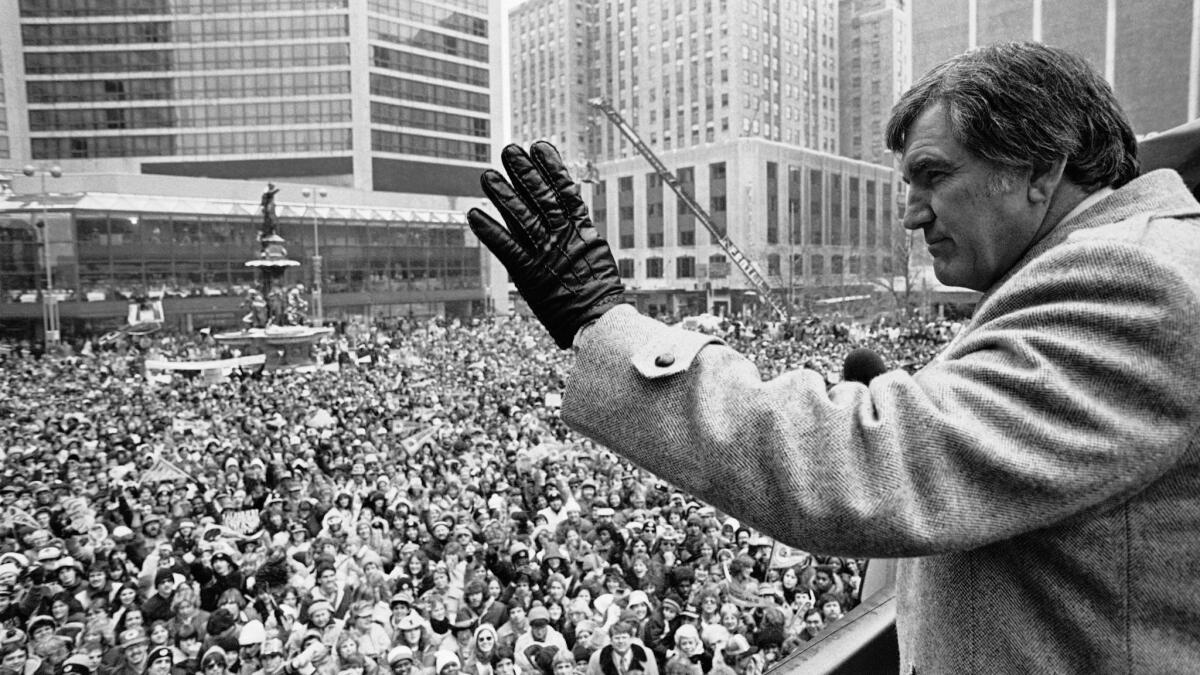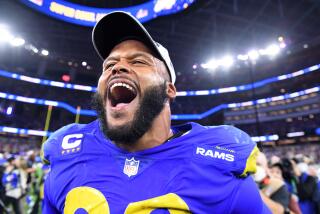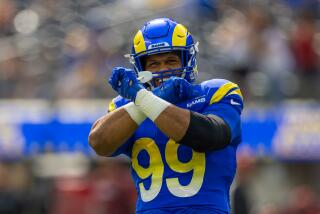Forrest Gregg, lineman for Lombardi’s mighty Packers, dies at 85

Forrest Gregg, the great Hall of Fame lineman for the mighty Green Bay Packers of the 1960s whom Vince Lombardi called the “finest player I ever coached,” has died from complications of Parkinson’s disease. He was 85.
Barbara Gregg said her husband of 59 years died Friday at a hospital in Colorado Springs, where they lived.
Hall of Fame President David Baker described Gregg, who was enshrined in 1977, as a “giant” who “exemplified greatness during a legendary career.”
“He was the type of player who led by example and, in doing so, raised the level of play of all those around him,” Baker said. “Forrest symbolized many great traits and virtues that can be learned from this game to inspire people from all walks of life.”
The flag at the hall will be flown at half-staff in Gregg’s honor.
Gregg, who earned the nickname “Iron Man” for playing in a then-record 188 consecutive games during his career, was diagnosed with Parkinson’s in 2011. He quickly embarked on a campaign to raise public awareness about the incurable disease, urging others to seek treatment early enough to delay the degenerative effects on both the mind and body.
His family and his neurologist said the disease may have been related to numerous concussions he suffered during his playing career in the 1950s at Southern Methodist University, and from 1956-71 with the Packers and Dallas Cowboys.
Gregg never blamed football for his health ailments, however. He refused to join concussion lawsuits against the NFL and said he still would have chosen to play the sport if he’d known there would be a hefty price to pay later in life.
In a 2013 interview, Gregg said he didn’t begrudge those who sued the league, but he had his pensions from his playing and coaching days, and “I don’t need anything from anybody but what I earned.”
A guard and tackle, Gregg is one of four NFL players to win a half dozen NFL championships, including the first two Super Bowls with the Packers. Gregg finished his career with another Super Bowl title with the Cowboys in 1971. The six-time All-Pro and nine-time Pro Bowler was elected to the NFL’s all-decade team of the 1960s and to its 75th anniversary team.
He went on to coach in the NFL for 11 years with the Browns, Bengals and Packers.
Packers coach Matt LaFleur tweeted a famous photo of a mud-caked Gregg and wrote, “I’d like to extend my deepest sympathies to the family of a true Packers legend, Forrest Gregg. This picture has been hanging in my home office for the last 10 years and serves as a great reminder of what a tough competitor Forrest was.”
After playing 15 NFL seasons, Gregg won 75 games as an NFL head coach and in 1981 guided the Bengals to their first Super Bowl, when they lost 26-21 to Joe Montana and the San Francisco 49ers.
Gregg was later hired at his alma mater to restore integrity to an SMU program that was handed the “death penalty” in the mid-1980s for paying players. He went on to become the school’s athletic director.
“That was one of the most enjoyable times of my football life,” Gregg said. “Those kids restored dignity to the Hilltop.”
Going public with his Parkinson’s diagnosis to promote understanding of the disease that affects more than 1 million Americans “was probably helpful a little bit,” said Dr. Rajeev Kumar of the Rocky Mountain Movement Disorders Center and the Parkinson’s expert who diagnosed Gregg in 2011. “It’s always good when somebody who’s known and respected lends their weight to the importance of research and education.”
Gregg suffered countless concussions during his college and pro seasons, and Kumar said those may very well have been the trigger to Parkinson’s.
Gregg continued to cast a dignified, larger-than-life presence even as the disease took its toll, stooping his once granite shoulders and turning his booming baritone into a halting whisper over the last few years.
In one of his last interviews, Gregg said he hardly recognized the NFL anymore because it was so different from the sport he played and coached. Despite that, his love for the game endured.
He lauded NFL Commissioner Roger Goodell for making safety a priority and praised the league for enhancing its concussion protocol and cracking down on illegal hits to the head, measures he hoped would lead to less suffering.
In addition to his wife, Gregg is survived by his son, Forrest Gregg Jr., and a daughter, Karen Gregg-Spehar.
More to Read
Start your day right
Sign up for Essential California for the L.A. Times biggest news, features and recommendations in your inbox six days a week.
You may occasionally receive promotional content from the Los Angeles Times.






